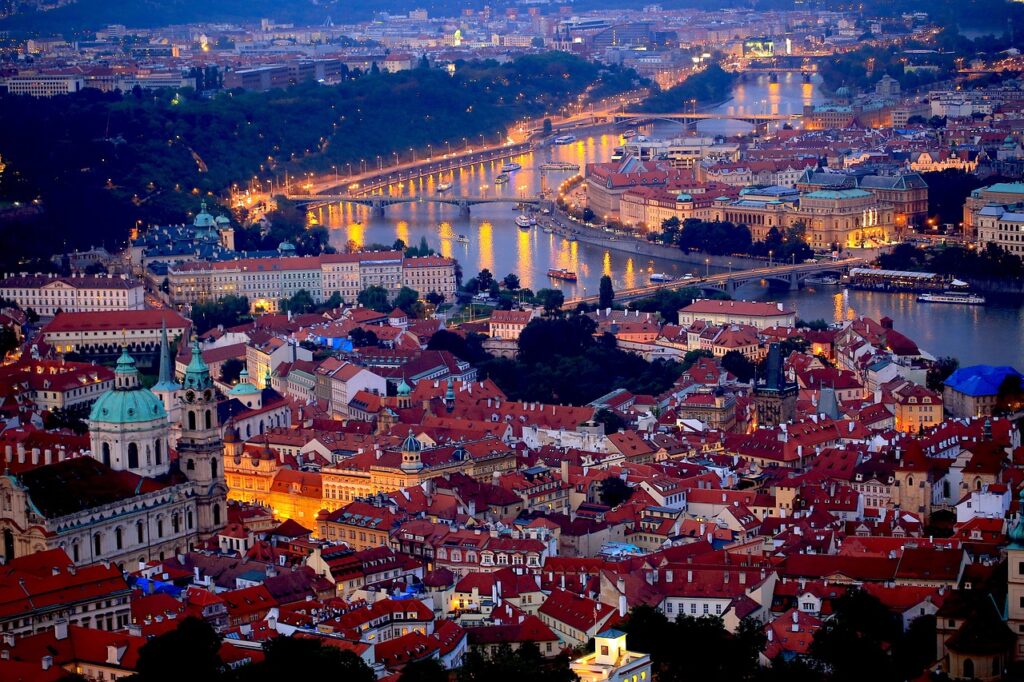
Nie masz czasu na zapoznanie się z całością artykułu?
Wystarczy, że klikniesz ikonę „oznacz artykuł do przeczytania później”. Wszystkie zapisane publikacje znajdziesz w profilu czytelnikaCentral Europe is a part of the West

In your opinion, is there such a thing as a common Central European identity? Something that unites the countries of the region historically and contemporarily? If so, what is it? If not, what are the most important differences between these states that make it impossible to claim the existence of such an identity?
Central Europe started to develop as a cultural-political entity at the beginning of the 19th century in fact after the Congress of Vienna (1814–1815). At the time recently established Austrian Empire (later Austria-Hungary) became its core. In short, Central European identity was forming in the grip between Austria, Russia, and the Ottoman Empire. Its specificity is caused by the fact that the Austro-Hungarian state straddled in between the West and the East while expanding to territories uninfluenced by the western tradition (partially Galicia, also Bukovina, Bosnia and Herzegovina…). It is impossible to briefly summarize the whole process ongoing all through the 19th and 20th century. Although, I would like to remind us of the common destiny of Central European nations, united and consumed by the Soviet-Russian empire after 1945. The argument “Central Europe”, as was used by Milan Kundera, does not mean that these countries form some kind of unique and original cultural or even civilizational union. After all, intellectuals of these countries (since we had no real politicians before 1989) tried to prove, that although we were soviet guberniyas, we are not by tradition the East, but still the West! This had an impact on the national self-reflection of the Eastern Europe, for example in Belarus and Ukraine – currently, almost nobody wants to be “Eastern Europe”, because the term itself holds a stigma of oriental uncivilization.
In his essay, Maciej Szymkiewicz writes: “Central European identity is like Voltaire’s God. Even if it does not exist, it would be necessary to invent it. Why invent a Central European identity? (…) it would allow us to create a real political community, which would be able to develop the potential of the nations of Central Europe, which will allow them to be independent and to be equal partners with their strong neighbours and powers from the East and the West, and, if difficult times come – who knows, maybe will even ensure their independence”. Do you agree with this thesis?
Personally, I found the essay of colleague Szymkiewicz strongly inspirative and provocative, in a good way. On the other hand, I do not share his basal thesis and what is more, pardon me on that, I find it potentially dangerous. The construction of the “Central Europe” as a specific entity between the West and the East stylizes us to the role of somewhat as the “third European alternative”. However – Central Europeans are by their historical experience and cultural foundations – since the middle ages and until today – part of the West. Certainly, we are not something between the West and the East! Central Europeanism can be compared to Scandinavian or Mediterranean regional identity which co-creates the colourful mosaic of diversity of the European and generally the Western world. In today’s globalized world where demons of Russian, Chinese, Turkish and Persian imperialism are awakening, it is crucial – and I absolutely believe in that – to cultivate common Western patriotism. Let’s be the patriots of the West and knowingly maintain its sense of freedom!
In Belarus and Ukraine, currently, almost nobody wants to be “Eastern Europe”, because the term itself holds a stigma of oriental uncivilization
How do you assess the current relations between the countries of Central and Eastern Europe? Did we overcome the most important animosities from the 20th century?
I do not want to moralize superficially, however, it seems to me that contacts between Central European countries (cultural, intellectual, political) are insufficient – we do not know each other enough! But that also applies to mutual relationships with Western European countries. This results in political consequences of a major gravity because divergent and competitive collective historical memories (and one-sidedly interpreted animosities) decrease the endurance of the whole Europe. A typical example is a divergent evaluation of Nazi and Soviet totalitarian and imperialistic expansion in the 20th century. Somewhat as “little Central Europe” is the Visegrád Group (V4) which does not work, in my opinion. I am afraid that Poland uses it only instrumentally, as does Hungary. The situation in Slovakia and Czech Republic could be compared to the sail of a sea vessel without the captain, whilst the Czech vessel has been already partially overrun by “pro-Russian pirates”. Countries of the V4 should care even more about mutual recognition and plurality of collective historical memories, even though it, unfortunately, includes a toxic tradition of the authoritarian national state. I am not concerned for Polish democracy. On the other hand, the Hungarian way, characterized by ethnical rather than civic principle, moreover, flirting with revisionist Russia, is, in my opinion, far more perilous than it seems. Maybe the V4 is already an anachronism and new forms of cooperation (and cultivation of common collective memory) should be sought for – for instance with Austria and Germany, and outside of the EU with Ukraine.
What should be the goals of the cooperation between the countries of Central and Eastern Europe? Should we join together in a coalition to gain a stronger voice in the European Union? Does the idea of the Trimarium/Three Seas Initiative make sense or, as its opponents claim, is it a pipe dream?
Generally, it can be said that Poland has a certain tradition in constructing “alternative blocs”, let’s mention for example the interwar project Intermarium. One can feel in it a bit of nostalgia for the bygone Polish empire as well as a legitimate ambition to become a regional power. And it certainly relates to the concern regarding Poland and Central/Eastern Europe becoming passive filling of some sort of a sandwich between Germany/Western Europe and Russia with its so-called “Russian world”. The vision of the Trimarium project makes sense only if it will support the geopolitical endurance of Europe and the West. In other words: it should not be just another group of lobbyists but ingenious addition to the mosaic of various EU and NATO initiatives. Therefore, it is important for the Trimarium initiative to enlist strategic partners from the key countries of the West – namely Germany, the USA, but also Great Britain, for example.
Central Europeanism can be compared to Scandinavian or Mediterranean regional identity which co-creates the colourful mosaic of diversity of the European and generally the Western world
In your opinion, is an autonomous Eastern policy of such countries as Czechia or Poland possible (first of all concerning Russia, Ukraine and Belarus) or should we follow the trend of Western policy towards the East?
As I have already said, Poland and Czechia are part of the Western civilization. The West is not identical to Western Europe and the Anglo-Saxon world. In this sense, both Poland and Czechia participate in creating Western geopolitical discourse and therefore should actively identify and shape its trends (and Poland is – from the outside view – quite successful in this). In some segments of national politics, it is our duty to create our autonomous international politics – we can support civic democratic initiatives in Belarus and Belarusian exile, develop cooperation (political, academic, intelligence, or even military) with Ukraine etc. Within the EU, we should be much more offensive in presenting our view on Russia (however Czech state representation led by president Zeman is currently servilely pro-Russian) and especially we should build a coalition upon interests promoting certain projects: on the level of NATO and EU. As an important tool, we still have the so-called Eastern Partnership. Even though it recently undergoes a certain crisis. The redefinition of this European “neighbourhood programme” has great potential and could be a Polish-Czech cup of tea.
In your interview for “Teologia Polityczna” you refer to Milan Kundera’s essay entitled “The West Kidnapped or The Tragedy of Central Europe”. In this essay, Kundera points out that Central Europe once had a huge influence on the entire continent but was “kidnapped” to the east because of communism. Is it possible to regain that influence now, 76 years after the “kidnapping” when the economic and social gap between Western European countries and Central and Eastern Europe has widened so much?
The situation in Slovakia and Czech Republic could be compared to the sail of a sea vessel without the captain, whilst the Czech vessel has been already partially overrun by “pro-Russian pirates”
Central and Eastern Europe is not only the eastern wing of Europe but of an entire Western civilization. Countries like Poland, Czechia, Slovakia, Hungary, as well as the Baltics etc. can be seen as a mental periphery of the West. Peripheries always presented important cultural-political laboratories. It also applies to our countries that have direct experience with civilizational alterity, be it with Eurasian (Orthodox and post-soviet) Russia, or Islamic Turkey. It will be valuable and educational for Western Europe or the USA if we insist on us being part of the political West. Therefore, we will participate on the occidental polyphony. Concurrently, we should not forget, that as an “eastern periphery” of the West we are a window for those European (non-Western) states for whom Europe and the West remains the subject of desire. What I mean here specifically is for example Ukraine, but also Georgia or North Macedonia. Providing such a stance, saying that the West is not perceived only as decadent and despicable, but also as a vessel for humanity, democracy, freedom and prosperity, could become a new source of self-confidence for the whole Western civilization.
Zobacz
The idea of “Solidarity” has been killed in Poland after 1989. Law and Justice fills this space only rhetorically
The tragedy of Poland is that it had to conform to the demands of the international Western community. It had to become aggressively capitalist and corporatist and it could not assert its independence. Jarema Piekutowski interviews Maurice Glasman
Khanna: Just because I'm a geopolitician by education, does not mean I'm an ideologue. Conectivity today is a battlefield for influence
Is Parag Khanna the second Fukuyama? Will we see a brutal race for the greatest possible connectedness? Or will conectivity bring peace, reduce the number of classic warfare? What will be the role of the West in this competition, and how much will the Belt and Road initiatives mean? Will nation-states fade away in favor of tribalism?
A Tale of Two Monsters and Four Elements: Variations of Carl Schmitt and the current global crisis
We have a class of scientific technocrats directing the work of a class of politicians without honour, who utterly subordinate everyone else. Only a spiritual revolution will save us now
India is, and will be a non-aligned power in the New Cold War
India is a non-aligned power; this move not only protects its own varied relations (as seen with India-Russia ties and even India-China bilateral) but also allows it to provide guidance and support to smaller economies in Asia and the Indo-Pacific
The Sino-Russian relationship should not be seen as an alliance of revisionist powers
Chinese do not feel comfortable with the seemingly endless “endism” produced by Western intellectual elites, be it Fukuyamanian “end of history” at the end of the Cold War, or the recent variant of the “end” of the so-called liberal international order (LIO)























